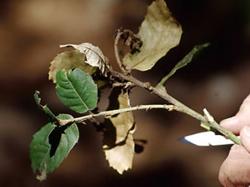Oregon Association Of Nurseries Responds To USDA-APHIS New Paperwork Burden
February 9, 2011 | 2 min to read

Wilsonville Ore. – Officials with the Oregon Association of Nurseries responded sharply to last Friday’s announcement that the USDA Animal and Plant Health Inspection Service (APHIS) is going forward with an advance notice requirement for five plant genera considered high risk for Phytophthora ramorum.
Despite strong evidence that confirms the pre-notification requirement will not mitigate the spread of P. ramorum, starting on March 1, nurseries in regulated or quarantined counties must notify receiving states before sending out any interstate shipments of Camellia, Kalmia, Pieris, Rhododendron (including Azalea), and/or Viburnum. Oregon counties that are impacted by the new Federal order are Clackamas, Columbia, Curry, Lane, Lincoln, Marion, Multnomah, Washington, and Yamhill. Nurseries shipping out of state from these counties must provide advance written notification to the product destination state.
The new requirement places another layer of paperwork on both federal agencies and nursery growers, who have been hit hard by a tough economy and higher costs of business. “The ‘pre-notification’ rule instituted by the federal order is a bureaucratic and regulatory burden on shippers as well as receiving states,” said Stone.
“The advance notice requirement unfairly treats all nurseries as if they were shipping infected material,” said Jeff Stone, Executive Director of the Oregon Association of Nurseries. “Worse, the requirement will bombard state offices with paperwork they aren't prepared to handle. This new federal order will do nothing to stop the spread of P. ramorum or other costly plant pests or diseases.”
The regulation was announced last spring, but delayed while federal officials considered objections and concerns raised by nursery associations in Oregon, Washington and California, as well as the American Nursery and Landscape Association (ANLA). APHIS had originally proposed a longer and more burdensome list of requirements that would have impacted growers in all Oregon counties and all nursery products. Nearly a year of fighting the onerous federal order resulted in fewer Oregon counties impacted, and only growers shipping five genera. “While we’re relieved that USDA has made some improvements to the order, the OAN will continue to advocate against this and other anti-competitive federal action,” said Stone.
The OAN has been active in supporting a national approach to dealing with the spread of pest and disease through annual federal dollars and the Farm Bill, called the “Systems Approach.” This method of managing threats in nurseries creates an effective way to deal with disease management that is cost effective for both the USDA and the nursery operator. Additionally, Oregon nurseries support a robust and effective early detection system through the Oregon Department of Agriculture.
The Oregon Association of Nurseries is evaluating the new regulation and working to provide its members with assistance on how best to deal with the new advance notice requirement.
# # #
The Oregon Association of Nurseries, based in Wilsonville, represents more than 1,200 wholesale growers, retailers, landscapers and suppliers. Oregon's ornamental horticulture industry is among the state's largest agricultural commodities, with annual sales of more than $740 million. Nearly 75 percent of the nursery plants grown in Oregon are shipped out of state. For information, visit www.oan.org or call (503) 682-5089.
Source: Oregon Association of Nurseries
